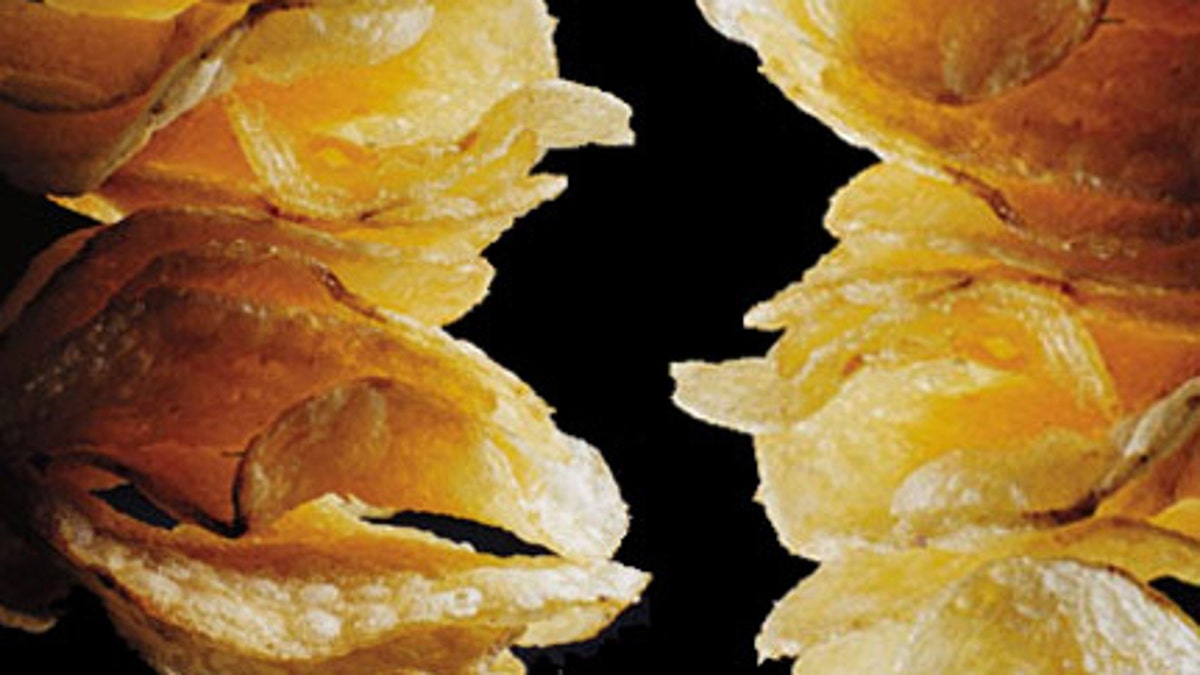
(CN Digital Archive)
Got a sweet tooth or a penchant for salty potato chips? More and more experts say that certain foods are addictive— and they have legit scientific studies to back up their claims. Here are four things we may want to declare war on.
Salt
If your mom had morning sickness when she was pregnant with you, that may be partially to blame for your intense appetite for all things salty now: When a pregnant woman vomits, her sodium levels and her fetus’s sodium levels become depleted, causing a possible lifelong preference for salty foods in the baby (see this story and this one if you don't believe us).
RELATED: The Only 5 Exercises You'll Ever Need
Not surprisingly, some experts blame other factors like stress, personality types, and the conditioning we've received from decades of food manufacturers and restaurants over-salting their dishes.
Cutting back on salt may be tough, though: Researchers at Duke University have found that the gene patterns activated during salt intake are the same groups of genes controlled by drug addiction. For the study, some mice were denied salt for three days and then given saltwater to chug. The brains of the salt-starved mice showed the same kind of activity associated with dependence on nicotine, cocaine, and heroin.
RELATED: How to Get Rock-Hard Abs Faster
"Blocking addiction-related pathways could powerfully interfere with sodium appetite," co-lead author Wolfgang Liedtke says. "Salt isn't typically as addictive as hard drugs, but it can be."
Of course, salt won't ruin your life like heroin will, Liedtke notes, though it has been proven to cause water-weight gain and high blood pressure, which can lead to heart failure, heart attack, and stroke.
Sugar and refined carbohydrates
There have been dozens of studies that found that sugar and other refined carbs with a high glycemic index (like flour and white rice) can be addictive and have a drug-like effect on the brain. A Princeton University study observed lab rats to see if they became addicted to a solution of sugar water (concocted to be equivalent to the percentage of sugar in most sodas). A drink here and there posed no problem. But when the rats were allowed to have the sugar water every day, they began to drink excessive amounts. The sugar water caused the release of dopamine, which regulates the brain's pleasure and reward centers. These dopamine levels were similar to those seen in animals on addictive drugs. The rats also suffered from real withdrawal symptoms (shakes and tremors) when denied the sugar water.
RELATED: The Squat-Free Way To Build A Strong And Lean Lower Body
Another notable study— this time with people— used MRIs to examine the brain activity of women as they looked at photos of food. Pictures of milkshakes lit up the same brain regions that become hyperactive in alcoholics anticipating a drink.
Fatty foods
Much like the milkshake study cited above, numerous brain scans of obese people and compulsive eaters reveal disturbances in the brain's reward circuits similar to those experienced by drug users. During a 2010 study, scientists fed rats various fatty, high-calorie junk foods, including bacon, sausage, and cheesecake. Later, the researchers replaced the unhealthy food with a healthier diet, and the rats refused to eat anything at all.
RELATED: How to Get That Sexy V-Line
The rats had become addicted to the dopamine-driven rewards and, because the healthier food didn't provide the same amount of pleasure, they opted for nothing. When the junk was around, the bingeing was hard to stop: The rats continued to overeat, even when they were conditioned to anticipate electric shocks.
RELATED: 14 Healthiest Snack Foods to Buy
Coffee
Researchers at the Harvard School of Public Health and Brigham and Women's Hospital in Boston recently found that people's love of coffee may be genetic. The study linked six new gene variations to coffee consumption and found that participants who inherited five or six of these variations were more likely to be heavy coffee drinkers than those who had just one or two of the variations.
What's more: "Some of the genes we identified have been implicated in addiction, so this may support the notion that caffeine is addictive for some people," lead author Marilyn Cornelis says. One of the key genes, known as BDNF, is also the same variant that is associated with a predisposition for smoking.
RELATED: Eating Your Way to a Better Sex Life
"Most psychologists don't recognize caffeine addictions, but they do consider withdrawal a mental disorder," Cornelis says. "And we know that people do have withdrawal— headaches, inability to concentrate, etc.— from caffeine. The symptoms are obviously not as severe as drug addictions, but they are similar to what you see with other addictive symptoms, like smoking."
Junk-food junkies, you have been warned. Seek counsel immediately.
